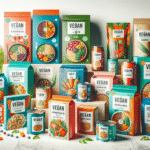Table of Contents
ToggleMalaysia and Vietnam Partner to Tap Global Halal Economy: Opportunities for Food Sensitivities & Dietary Preferences
Published: June 2024 | Author: Halal Market Insights Team
Introduction: Malaysia and Vietnam Join Forces in the Global Halal Economy
The global halal economy is experiencing unprecedented growth, with Southeast Asia at the forefront of this expansion. According to a recent report by The Star, Malaysia and Vietnam are forging a strategic partnership to tap into the lucrative global halal market. This collaboration is not only significant for economic growth but also holds promise for individuals with food sensitivities and diverse dietary preferences. With the integration of advanced food safety apps like Food Scan Genius and Yuka, the halal industry is becoming more transparent and accessible than ever before.
Understanding the Global Halal Economy
The halal economy encompasses a wide range of industries, including food and beverages, cosmetics, pharmaceuticals, and tourism. According to the State of the Global Islamic Economy Report 2023/24, the global halal market is projected to reach USD 7 trillion by 2025. Southeast Asia, home to a large Muslim population, is poised to be a key player in this growth.
Malaysia has long been recognized as a global leader in halal certification and standards, while Vietnam, with its strategic location and robust manufacturing sector, offers immense potential for halal production and export. By combining their strengths, these countries aim to capture a larger share of the international halal market, which is increasingly being shaped by consumer demands for transparency, safety, and inclusivity.
Malaysia and Vietnam’s Strategic Partnership: Key Highlights
The partnership between Malaysia and Vietnam was highlighted by Malaysian Ambassador to Vietnam, Datuk Dato’ Tan Yang Thai, during a recent interview with The Star. The envoy emphasized that this collaboration is designed to leverage Malaysia’s expertise in halal certification and Vietnam’s manufacturing capabilities to meet the growing global demand for halal products.
- Halal Certification: Malaysia’s Jakim (Department of Islamic Development Malaysia) will provide guidance and support to Vietnamese companies seeking halal certification.
- Trade and Investment: Both countries are encouraging joint ventures and investments in halal food processing, logistics, and supply chains.
- Market Expansion: The partnership aims to increase exports of halal-certified products to the Middle East, Europe, and other Muslim-majority markets.
This collaboration is expected to create new opportunities for businesses and consumers, particularly those with specific dietary needs and food sensitivities.
Halal Food and Food Sensitivities: A Natural Alignment
Halal certification is not only about religious compliance; it also ensures that food products are safe, hygienic, and free from harmful ingredients. For individuals with food allergies, intolerances, or specific dietary preferences (such as gluten-free, dairy-free, or vegan), halal-certified products often meet higher standards of ingredient transparency and safety.
Recent research published in the Frontiers in Nutrition (2024) highlights the growing demand for food products that cater to both religious and health-related dietary restrictions. The study found that consumers with food sensitivities are increasingly seeking products that are not only halal but also free from common allergens and artificial additives.
By focusing on halal certification, Malaysia and Vietnam are well-positioned to serve this expanding market segment, offering products that are both compliant and safe for people with diverse dietary needs.
Halal Certification: Ensuring Safety and Transparency
The halal certification process involves rigorous checks on ingredients, processing methods, and supply chain management. This level of scrutiny ensures that products are free from contaminants, allergens, and non-permissible substances. For consumers with food sensitivities, this translates to greater confidence in the safety and quality of the food they consume.
In 2024, the Halal Journal reported that halal-certified products are increasingly being recognized for their strict quality control measures, making them a preferred choice for health-conscious consumers worldwide.
Technology in Halal Food: The Role of Food Scan Genius and Yuka
As the halal industry grows, so does the need for transparency and information accessibility. Digital tools like Food Scan Genius and Yuka are revolutionizing the way consumers make informed choices about their food, especially for those with dietary restrictions and sensitivities.
What is Food Scan Genius?
Food Scan Genius is an innovative mobile app that allows users to scan barcodes on food products to instantly access detailed information about ingredients, allergens, and certification status, including halal compliance. This app is particularly beneficial for consumers in Malaysia and Vietnam, where the halal market is rapidly expanding.
What is Yuka?
Yuka is another popular app that analyzes food products for nutritional quality, additives, and potential allergens. While not exclusively focused on halal, Yuka’s comprehensive database and user-friendly interface make it a valuable tool for anyone with food sensitivities or dietary preferences.
Integration with Halal Certification: Both Food Scan Genius and Yuka can help bridge the information gap for consumers seeking halal-certified products that also meet their health and dietary needs. By scanning products, users can quickly determine if an item is halal, gluten-free, vegan, or free from specific allergens.
Market Opportunities: Catering to a Diverse Consumer Base
The collaboration between Malaysia and Vietnam opens up new avenues for businesses to cater to a global consumer base with diverse needs. According to a 2024 report by Research and Markets, the global halal food market is witnessing a surge in demand from non-Muslim consumers who value the safety, quality, and transparency associated with halal products.
- Allergen-Free Products: Halal-certified products are often free from common allergens such as pork, alcohol, and certain preservatives.
- Clean Label Movement: Consumers are increasingly seeking products with simple, recognizable ingredients—an area where halal-certified foods often excel.
- Vegan and Vegetarian Options: Many halal products are plant-based, appealing to vegans, vegetarians, and those with lactose intolerance.
By leveraging halal certification and embracing technological innovations, Malaysia and Vietnam can position themselves as leaders in the global market for safe, inclusive, and high-quality food products.
Challenges and Solutions in the Halal Supply Chain
Despite the opportunities, there are challenges to be addressed in the halal supply chain, particularly regarding traceability and cross-contamination. A 2024 study in Foods Journal emphasized the importance of digital traceability systems in maintaining halal integrity throughout the supply chain.
Malaysia and Vietnam are investing in advanced logistics and blockchain technology to enhance transparency and traceability. These efforts are crucial for ensuring that halal-certified products meet the highest standards of safety, especially for consumers with severe food allergies or sensitivities.
Consumer Awareness and Education: A Key to Success
Educating consumers about the benefits of halal-certified products is essential for market growth. In 2024, the Global Halal Industry Report highlighted the need for greater awareness campaigns to inform both Muslim and non-Muslim consumers about the health and safety advantages of halal foods.
Apps like Food Scan Genius and Yuka play a pivotal role in this educational process by providing instant, reliable information at the point of purchase. This empowers consumers to make choices that align with their dietary needs and personal values.
Future Prospects: Malaysia and Vietnam as Global Halal Leaders
The partnership between Malaysia and Vietnam is set to redefine the global halal economy. By combining Malaysia’s certification expertise with Vietnam’s manufacturing prowess, the two countries can create a robust ecosystem for halal products that cater to a wide range of dietary requirements.
With the integration of digital tools, enhanced supply chain management, and a focus on consumer education, Malaysia and Vietnam are well-positioned to become global leaders in the halal industry by 2025 and beyond.
Conclusion: A New Era for Halal, Food Sensitivities, and Dietary Preferences
The strategic partnership between Malaysia and Vietnam marks a significant milestone in the evolution of the global halal economy. By prioritizing food safety, transparency, and inclusivity, both countries are setting new standards for the industry.
For individuals with food sensitivities and specific dietary preferences, the growth of the halal market—supported by advanced certification processes and digital apps like Food Scan Genius and Yuka—offers unprecedented access to safe, high-quality, and trustworthy food products.
As the global halal economy continues to expand, Malaysia and Vietnam’s collaboration serves as a model for other nations seeking to balance tradition, innovation, and consumer well-being in the food industry.
Frequently Asked Questions (FAQ)
1. What is halal certification and why is it important?
Halal certification ensures that products comply with Islamic dietary laws and meet strict safety and quality standards. It is important for both religious and health reasons, particularly for consumers with food sensitivities.
2. How does halal certification benefit people with food allergies or sensitivities?
Halal-certified products are subject to rigorous ingredient checks and are often free from common allergens and harmful additives, making them safer for individuals with food allergies or sensitivities.
3. What roles do Food Scan Genius and Yuka play in the halal food industry?
These apps provide instant access to product information, including halal certification status and allergen content, helping consumers make informed choices based on their dietary needs.
4. How will the Malaysia-Vietnam partnership impact the global halal market?
The partnership will enhance the supply of halal-certified products, improve quality standards, and expand market reach, benefiting consumers worldwide, especially those with specific dietary requirements.
5. Where can I find more information about halal products and certification?
Visit official websites such as Malaysia’s Halal Portal or use trusted food apps like Food Scan Genius and Yuka for up-to-date product information.
Related Posts
- Wheat Protein Market Projected to Reach USD 10.44 Billion by 2034 Growing at a CAGR of 4.1% As Revealed In … – WhaTech
- Abbott’s ‘Food is Medicine’ programme improves diet quality and health, study reveals – Nutraceutical Business Review
- Best Gluten Free App Scan Barcode for Easy Shopping





